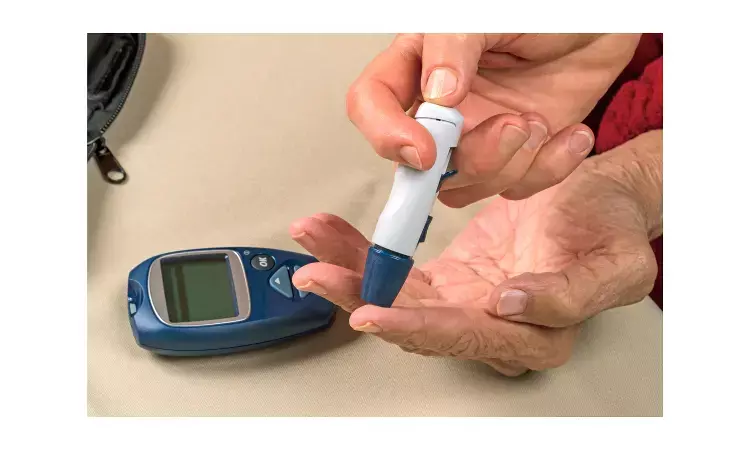- Home
- Medical news & Guidelines
- Anesthesiology
- Cardiology and CTVS
- Critical Care
- Dentistry
- Dermatology
- Diabetes and Endocrinology
- ENT
- Gastroenterology
- Medicine
- Nephrology
- Neurology
- Obstretics-Gynaecology
- Oncology
- Ophthalmology
- Orthopaedics
- Pediatrics-Neonatology
- Psychiatry
- Pulmonology
- Radiology
- Surgery
- Urology
- Laboratory Medicine
- Diet
- Nursing
- Paramedical
- Physiotherapy
- Health news
- Fact Check
- Bone Health Fact Check
- Brain Health Fact Check
- Cancer Related Fact Check
- Child Care Fact Check
- Dental and oral health fact check
- Diabetes and metabolic health fact check
- Diet and Nutrition Fact Check
- Eye and ENT Care Fact Check
- Fitness fact check
- Gut health fact check
- Heart health fact check
- Kidney health fact check
- Medical education fact check
- Men's health fact check
- Respiratory fact check
- Skin and hair care fact check
- Vaccine and Immunization fact check
- Women's health fact check
- AYUSH
- State News
- Andaman and Nicobar Islands
- Andhra Pradesh
- Arunachal Pradesh
- Assam
- Bihar
- Chandigarh
- Chattisgarh
- Dadra and Nagar Haveli
- Daman and Diu
- Delhi
- Goa
- Gujarat
- Haryana
- Himachal Pradesh
- Jammu & Kashmir
- Jharkhand
- Karnataka
- Kerala
- Ladakh
- Lakshadweep
- Madhya Pradesh
- Maharashtra
- Manipur
- Meghalaya
- Mizoram
- Nagaland
- Odisha
- Puducherry
- Punjab
- Rajasthan
- Sikkim
- Tamil Nadu
- Telangana
- Tripura
- Uttar Pradesh
- Uttrakhand
- West Bengal
- Medical Education
- Industry
Fully closed-loop insulin therapy safe, effective in diabetes patients requiring dialysis: Study

UK: A new study in the journal Nature Medicine has reported that fully closed-loop insulin therapy improved glucose control and reduced hypoglycemia compared with standard insulin therapy in adult outpatients with type 2 diabetes requiring dialysis.
Management of diabetes in this population is challenging for both patients and healthcare professionals as it poses severe complications of the kidney and heart. Closed-loop systems are increasingly being applied for the management of type 1 diabetes. However, the use of this technology in people with type 2 diabetes is limited to the inpatient setting including those on hemodialysis.
Charlotte K. Boughton, Cambridge University Hospitals NHS Foundation Trust, Wolfson Diabetes and Endocrine Clinic, Cambridge, UK, and colleagues, therefore, aimed to evaluate the safety and efficacy of fully closed-loop insulin therapy compared with standard insulin therapy in adults with type 2 diabetes requiring dialysis.
The study was an open-label, multinational, two-center, randomized crossover trial, 26 adults with type 2 diabetes requiring dialysis (17 men, 9 women, average age 68 ± 11 years (mean ± s.d.), diabetes duration of 20 ± 10 years) underwent two 20-day periods of unrestricted living, comparing the Cambridge fully closed-loop system using faster insulin aspart ('closed-loop) with standard insulin therapy and a masked continuous glucose monitor ('control') in random order. The primary endpoint was a time in target glucose range (5.6–10.0 mmol l−1).
A total of 13 participants received closed-loop first and thirteen received control therapy first.
The results of the study were
• The proportion of time in target glucose range (5.6–10.0 mmol l−1; primary endpoint) was 52.8 ± 12.5% with closed-loop versus 37.7 ± 20.5% with control; mean difference, 15.1 percentage points.
• Mean glucose was lower with closed-loop than control (10.1 ± 1.3 versus 11.6 ± 2.8 mmol l−1). Time in hypoglycemia (<3.9 mmol l−1) was reduced with closed-loop versus control (median (IQR) 0.1 versus 0.2).
Boughton and team concluded that "Fully closed-loop improved glucose control and reduced hypoglycemia compared with standard insulin therapy in adult outpatients with type 2 diabetes requiring dialysis." They also stated that no severe hypoglycemia events occurred during the control period, whereas one severe hypoglycemic event occurred during the closed-loop period, but not during closed-loop operation.
For further information: https://doi.org/10.1038/s41591-021-01453-z
Medical Dialogues consists of a team of passionate medical/scientific writers, led by doctors and healthcare researchers. Our team efforts to bring you updated and timely news about the important happenings of the medical and healthcare sector. Our editorial team can be reached at editorial@medicaldialogues.in.
Dr Kamal Kant Kohli-MBBS, DTCD- a chest specialist with more than 30 years of practice and a flair for writing clinical articles, Dr Kamal Kant Kohli joined Medical Dialogues as a Chief Editor of Medical News. Besides writing articles, as an editor, he proofreads and verifies all the medical content published on Medical Dialogues including those coming from journals, studies,medical conferences,guidelines etc. Email: drkohli@medicaldialogues.in. Contact no. 011-43720751


